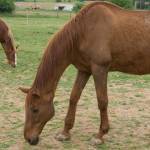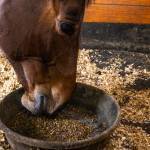Causes of Death in Older Horses Examined

According to a group of researchers from Purdue University, maximizing equine health, especially among aged equines, requires knowledge of what ultimately causes their demise. Currently, “old age” is frequently reported as a cause of death. In reality, simply being old does not result in loss of life.
“The number of ‘old’ horses is increasing due to improved veterinary care and the willingness of owners to manage horses into their 20s, 30s, and even 40s,” noted Kathleen Crandell, Ph.D., a Kentucky Equine Research nutritionist. “Rather than simply watching horses age ungracefully, more and more veterinarians and owners are taking the bull by the horns, embracing strategies to maximize health and longevity.”
Throughout the industry, horse owners have generally thought that the leading causes of illness in older horses included lameness due to arthritis or chronic laminitis, colic, heaves, and Cushing’s disease.
But is this impression accurate?
After analyzing information gathered during 241 postmortem examinations in horses between 15 and 35 years of age, Miller and colleagues assert that those above-mentioned conditions are among the leading causes of death among older horses.
“Diseases of the digestive system were by far the most common cause of death in older horses,” summarized Crandell.
Specifically, 100 of the horses (42%) succumbed to gastrointestinal disease, including impactions, ruptures, displacements, and strangulations. The next leading reasons for euthanasia were Cushing’s disease, lameness and laminitis, tumors, and neurological disorders. Further down on the list were cardiovascular, urinary, reproductive, respiratory, and other organ-system dysfunction.
“Nutrition plays a key role in the management of many of these health concerns,” Crandell confirmed, “so when one of these problems crops up in an aged horse, it is important to get sound advice. In many instances, this advice comes from two sources, a veterinarian and a knowledgeable nutritionist.”
To maximize your horse’s health through nutrition, consult with a Kentucky Equine Research nutritionist today.
*Miller, M.A., G.E. Moore, F.R. Bertin, et al. 2016. What’s new in old horses? Postmortem diagnoses in mature and aged equids. Veterinary Pathology. 53(2):390-398.








